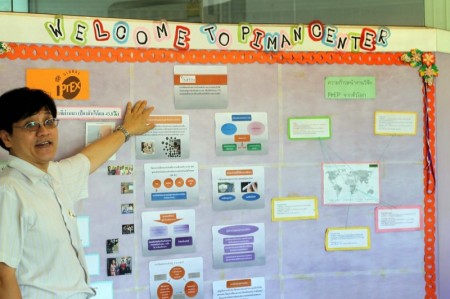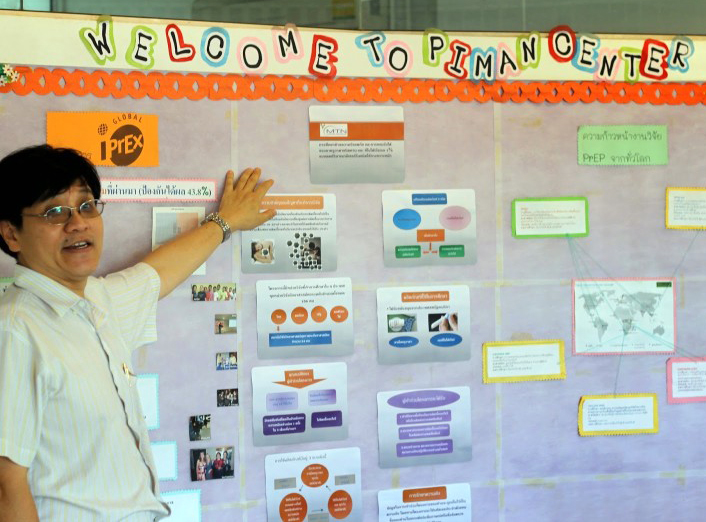Overall new HIV infection rates have dipped by 26% in Asia and the Pacific region since 2001, but not for key populations such as men who have sex with men (MSM) and transgender people (source: UNAIDS Asia Pacific report, November 2013). According to estimates, between 15% and 25% MSM of this region are living with HIV, largely in major cities. In China, Indonesia, Malaysia, Myanmar, Thailand and Viet Nam, the estimated national HIV prevalence for MSM is over 5%. And it continues to rise in several cities and regions within these countries, as well as in India, Mongolia and the Philippines, underlining the need for a greater attention for HIV prevention.
Despite limited research on HIV prevalence among transgender people, the little data that is available shows a high HIV prevalence among them too: 30.8% in Jakarta, 23.7% in Port Moresby and 18.8% in Maharashtra, India.
Current HIV prevention options, such as condoms, are clearly not arresting the rate of spread of HIV among MSM and transgender people in Asia and the Pacific region. Condom use also remains much lower than desired. It is also known that those MSM and transgender people who use condoms also use lubricants (or lubes) during anal intercourse. Importantly, the use of condom-compatible lubes has been associated with a decreased risk of breaking or slipping of condoms. However, condom-compatible lubricant is inaccessible for most people who engage in anal intercourse.

RECTAL MICROBICIDES
Undoubtedly, we need to expand the range of HIV prevention options for those practicing anal sex. Rectal microbicides– in the form of gels or lubricants – are products that are currently under research and are being developed and tested to reduce a person’s risk of HIV or other sexually transmitted infections from anal sex. The risk of becoming infected with HIV during unprotected anal sex is 10 to 20 times greater than unprotected vaginal sex because as the rectal lining is only one-cell thick, the virus can more easily reach the immune cells and infect them.
MTN017 Study in Chiang Mai
The first-ever phase-II extended-safety study (formally called MTN017) of a rectal microbicide in the Asia-Pacific region has begun in Chiang Mai, Thailand since February 2014. Research Institute for Health Sciences (RIHES), Chiang Mai University, which has been a research site for over 35 major International studies in the past years, is one of the sites for MTN017. In total, there are 8 study sites including Chiang Mai, such as: CDC Bangkok (where study will commence very soon), South Africa, Peru and in US.
The objective of this rectal microbicide study is to study the safety and acceptability of a rectal microbicide gel for now. This study will perhaps also give information on issues such as adherence of study participants to the study product. Depending upon the outcome of this study (if study product is found safe and acceptable) efficacy studies will be conducted later.
MTN017 study product (PrEP)
Pongpun Saokhieo, Coordinator for this study at RIHES, said to Citizen News Service (CNS): In this study every participant will have the same duration of exposure (eight weeks) to three different regimens (with a one week gap between each regimen):
– oral Truvada/PrEP daily for eight weeks,
– rectal gel (reduced glycerin and tenofovir gel) daily for eight weeks, and
– sex dependent rectal gel for eight weeks (applied anytime during the window period of 12 hours before and 12 hours after having anal sex). In case there is no sexual activity for one week, gel has to be applied anyway.
So for each participant the entire duration of the study period is 6 months. There is no placebo arm in the study.







[…] Current HIV prevention options, such as condoms, are clearly not arresting the rate of spread of HIV among MSM and transgender people in Asia and the Pacific region. Condom use also remains much lower than desired. It is also known that those MSM and transgender people who use condoms also use lubricants (or lubes) …read more […]
I can already predict the results:
Truvada will show itself to be effective when used as intended.
AHF will denounce the results as inaccurate and the study as irresponsible.